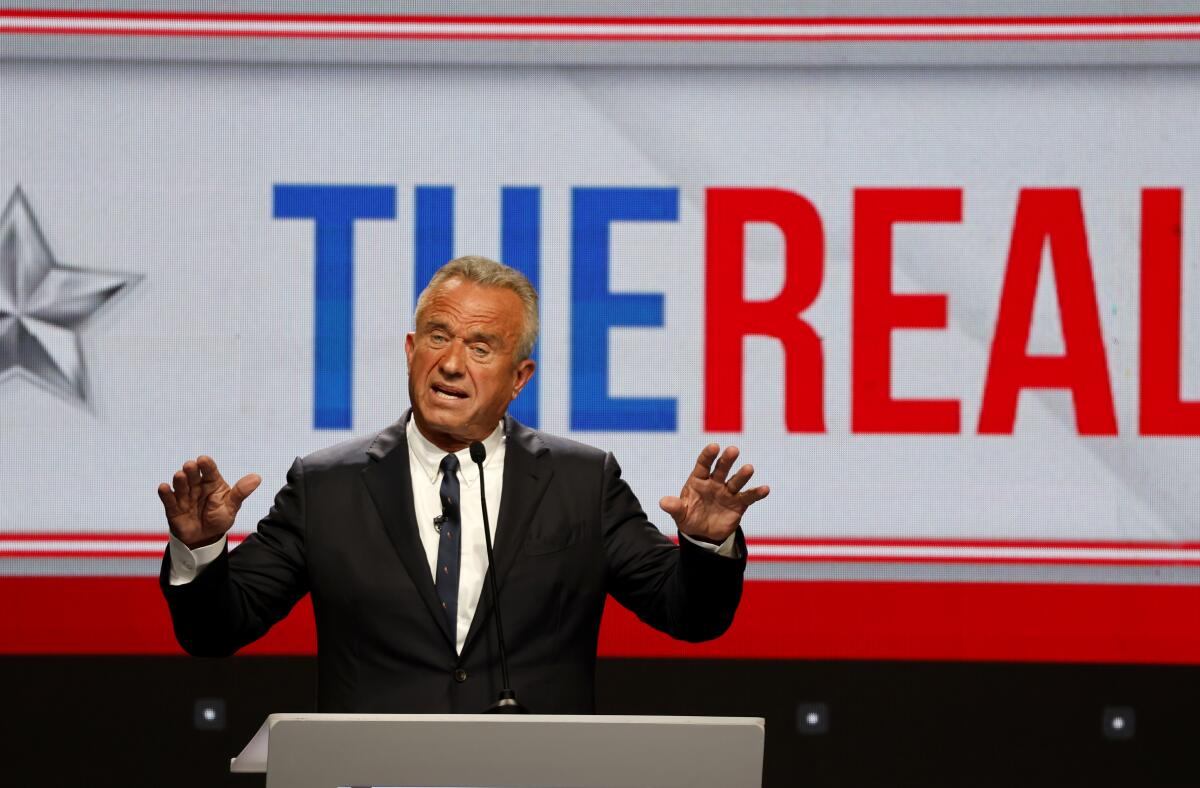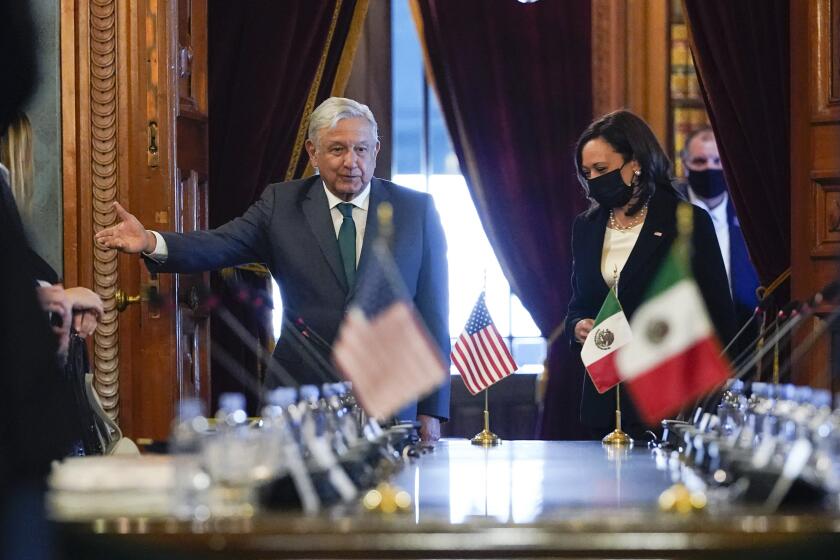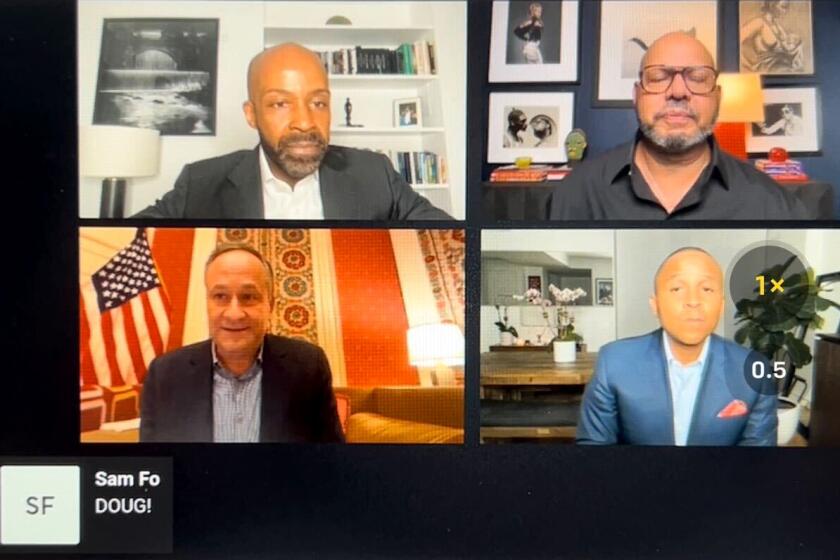Robert F. Kennedy Jr. struggles for relevance as presidential campaign is remade

A faltering debate performance, an assassination attempt and a dramatic exit from the presidential race all had one thing in common — they put Robert F. Kennedy Jr. even farther from the spotlight in the race for the White House.
Kennedy insists that his time is still coming and that President Biden’s decision to bow out in favor of Vice President Kamala Harris has driven a surge of interest in his independent campaign. But experts said they see this month’s historic events doing the opposite, pushing the independent candidate farther from relevancy.
Kennedy’s greatest recent attention came not because of news of progress in his own campaign, but when the Washington Post disclosed that he had talked to former President Trump about endorsing his campaign and taking a job in a second Trump administration.
“It sounded like he was nothing but a rank opportunist,” said Michael A. Genovese, a political scientist at Loyola Marymount University. “That was devastating for him.”
Melissa M. Smith, an expert on independent presidential candidates, said Kennedy’s path to relevancy has become even more difficult.
“The Republicans and the Democrats are just sucking all the oxygen out of the room right now,” said Smith, author of “Third Parties, Outsiders, and Renegades: Modern Challenges to the Two-Party System in Presidential Elections.” “There hasn’t been the opportunity for Kennedy to break through because there is so much stuff going on with major candidates.”
Kamala Harris struggled to find her political footing in her early years as vice president. Her allies say that has changed since Roe vs. Wade was overturned.
In a telephone interview from his family’s compound in Hyannis Port, Mass., Kennedy downplayed his conversation with Trump, saying he would also be open to talking to Harris or “anybody who wants to protect children’s health” — a topic he said was part of his 90-minute conversation with Trump. (Though he acknowledged that Harris probably did not want to talk to him.)
The environmental lawyer, who lives in Los Angeles most of the year, said Biden’s exit last week “injected a lot of energy into our campaign.” He added: “We’re getting a giant surge in volunteers, in contributions and in social engagement.”
The new campaign funds claimed by Kennedy’s camp have not yet shown up in Federal Election Commission records. Reports filed with the election agency showed that American Values 2024, the super PAC backing Kennedy, raised just $228,000 in June. His own campaign raised $5.4 million, while banking heavily on the $2.5 million donated by his running mate, Nicole Shanahan. But it spent more: $6.2 million.
Kennedy’s campaign had $5.6 million in cash at the end of June, a tiny fraction of the $128 million banked by Trump and the $96 million held by Harris, FEC records show. And that was before the vice president reportedly enjoyed a surge of donations, after Biden endorsed her to become the Democratic nominee.
The independent candidate also had to go on the defensive after a Vanity Fair article reported that a weekend babysitter accused him of sexual assault when she was in her early 20s and worked for the Kennedy family in the 1990s. Text messages revealed that the candidate apologized to the woman after publication of the article, but Kennedy told reporters he recalled nothing about the alleged attacks.
Independent and third-party candidates traditionally struggle to draw the attention of those running for the major parties. One exception came in June 1992, when businessman Ross Perot surged into a brief lead, ahead of President George H.W. Bush and Democratic challenger Bill Clinton. Perot faded, and Clinton went on to victory.
Perot had enough traction that the Commission on Presidential Debates included him in all three debates in fall 1992. Kennedy’s exclusion from last month’s debate exemplified the challenge he faces.
More than 51 million Americans watched television coverage of the showdown, with Biden’s rambling and vague performance prompting a groundswell for him to leave the race. Kennedy countered by simulcasting his own answers to the debate questions. The YouTube program got fewer than 800,000 streams.
“There is only so much room for news, and it’s hard to see how he can get a lot of news attention unless he does something completely unheard of or outlandish,” said Smith, a professor of communications at Mississippi University for Women. “He has the misfortune to be in this campaign where something unprecedented happens, putting so much focus on Harris. And it’s really hard to outdo Trump, for drawing attention.”
Genovese said Kennedy faces an additional hurdle: At 70, he offered a slightly younger option for Americans displeased with having to choose between two of the oldest candidates in history — Biden, 81, and Trump, 78. Harris, 59, is now a far more youthful alternative.
“When we had the two least popular candidates in history on the ballot, or that prospect, I think a third-party candidate might be someone you take a look at,” Genovese said. “But with Harris’ entry into the race, that takes age off the table. I think a lot of Democrats are going to come home to her.”
Kennedy argued that disappointment with both parties festers and will help him in the long run. Last week, he announced an “America Strong” initiative — meant to draw the sort of nonpartisan unity exhibited after facing natural disasters.
“What we have not had is a unity government,” Kennedy said, “headed by an independent president, beholden to no party, free from corporate influence, owing no favors to the Washington establishment, and ready to recruit the best ideas from both parties and from all those who have been left out.”
While he has criticized both parties, Kennedy’s has focused more of his wrath of late on the Democrats — the party of his father, Sen. Robert F. Kennedy, and his uncle, President Kennedy.
He chastised Harris, saying she had been “playing a lead role in assuring the country that President Biden had no cognitive impairment. And I think people now realize that was not true.”
Emhoff said Biden’s announcement caught him by surprise. He had just finished a SoulCycle class in West Hollywood and didn’t have his phone.
“I think Americans want to be able to trust their leaders,” he added, “and there is an appearance, at least, that she put her political ambitions ahead of our national interests.”
While Kennedy has been an energetic campaigner and draws a fanatical following among some Americans, most national polls have shown his support lingering in the single digits. He has been viewed by many as a fringe candidate, with the scientific and medical mainstream rejecting his claims that vaccines commonly injure people and can cause autism.
He excoriated both Trump and Democrats for the “500-day lockdown” that followed the spread of COVID-19 in 2020. He called the shutdown of churches, public gatherings and the tracing of health data part of “the greatest assault on the Constitution in American history.”
Kennedy announced in October that he would drop his bid for the Democratic nomination and run as an independent.
After Biden’s exit, Kennedy torched the president for his quick “anointment” of Harris. He said the Democratic nominee should be chosen, instead, based on a series of “zero-margin-of-error polls,” measuring which candidate stood the most likely to defeat Trump.
“And if they did that, by the way, I would win,” Kennedy said. He pointed to a poll conducted for his campaign that showed him besting the Republican.
A New York Times-Siena poll released Thursday found Harris and Trump in a virtual dead heat nationally, with the Republican leading by 1 percentage point among likely voters. With Kennedy and other independent and third-party candidates added to the mix, the poll showed Harris with a 1-percentage-point lead over Trump, with Kennedy a distant third at 5%.
Kennedy’s criticism of Democrats have provoked anger and disdain in the party, including from members of his extended family, members of one of America’s great political dynasties.
After news of the recent confab between Kennedy and Trump, the Democratic National Committee released a scathing statement.
Said DNC spokesman Matt Corridoni: “That RFK Jr. was engaging in the same backroom political deals that he claims to despise shows that he knows his spoiler candidacy isn’t going to land him in the White House.”
More to Read
Get the L.A. Times Politics newsletter
Deeply reported insights into legislation, politics and policy from Sacramento, Washington and beyond. In your inbox three times per week.
You may occasionally receive promotional content from the Los Angeles Times.













